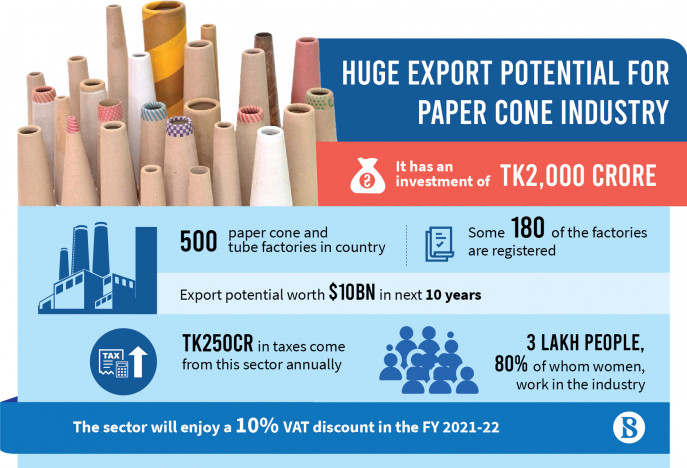Highlights:
- The sector has an investment of Tk2,000 crore
- Currently, there are some 500 paper cone and tube factories in the country
- About 180 of the factories are registered
- Entrepreneurs claim the factories are environmentally friendly
- The industry pays government taxes of around Tk250 crore annually
- This industrial sector employs nearly 3 lakh people, 80% of whom are women
- The sector will enjoy a 10% vat discount in FY 2021 – 22
- Entrepreneurs think the sector has $10bn export potential over the next 10 years
Failing in Secondary School Certificate (SSC) exam in 2001, a heartbroken Jobaer Hossain Rana decided to move to his uncle’s house in Narsingdi from his village home in Sirajganj.
Rana took up a job at his uncle’s yarn factory to get away from his family’s frustration with him and the poverty that plagued his life.
While he was working at the factory, Rana decided to start making paper cones. With a capital of about Tk50,000, he started his venture in a rented house. Fast forward 10 years. Rana is now a successful entrepreneur and owns machinery worth Tk1 crore and other assets.
With his business, Rana became solvent and he now also takes care of around 50 children at an orphanage in Narsingdi.
“I started my factory with only 10 employees. Initially, we produced about 10,000 – 12,000 paper cones daily, but now we produce nearly one lakh pieces daily. My factory directly employs 50 people right now,” said Rana.
The paper cones and tubes Rana makes in his factory are a type of yarn carrier with a tapered end that is widely used in the spinning, textile, jute mills and poly pack industries. These paper cones are made from recycled waste paper.
Before 2010, Bangladesh would need to import to meet most of the total demand for paper cones. But at present, the local demand for paper cones is met by domestically produced cones using local raw materials and advanced technology.
According to the Bangladesh Paper Cone and Tube Manufacturers Association (BPCTMA), there are now some 500 paper cone and tube factories in the country and of those, 180 are registered. The factories are environmentally friendly and the manufactured products are used in around 600 spinning mills across the country.
There is a Tk2,000 crore investment in the industry, and the government annually collects taxes of around Tk250 crore from this sector. It also employs more than three lakh people, almost 80% of whom are women.
Shaon Mahmud is another successful businessman like Rana and is the current general secretary of BPCTMA.
Mahmud started his paper cone and tube business in 1999 with only Tk52,000 in capital, and seven employees. He used to produce some 12,000 paper cones daily but now his daily production has reached 50,000.
“Setting up the factory was not easy. Initially it was hard to get on our our feet due to cheap import alternatives at the time. But when the government imposed a duty on imported paper cones, we were back in business,” Mahmud said.
Akbar Ali, senior vice-president, BPCTMA, said local entrepreneurs used to incur losses before 2010 as there was no duty on imported foreign paper cones and tubes. In 2010, when the government imposed a 15% duty on the import of foreign paper cones and tubes, the domestic industry picked up dramatically.
Ali thinks that the reduced vat of 5% on domestically produced paper cones and tubes in the 2021-22 budget has opened a door to new possibilities in this sector.

Huge export potential
Sarkar Mohammad Salahuddin, president of BPCTMA, thinks the country’s paper cone industry has tremendous export potential.
“Our factories are 100% environmentally friendly and currently there is a promising annual business turnover of Tk1,000 crore in this sector. If the industry is given benefits like other sectors, in the next 10 years, the paper cone industry will export goods worth close to $10bn,” he said.
He added that exemption from vat and tax will help this sector immensely.
Salahuddin also wanted this sector to be treated like an export industry which would enable businesses to import raw materials from abroad and open Letters of Credit (LC) for export.
















